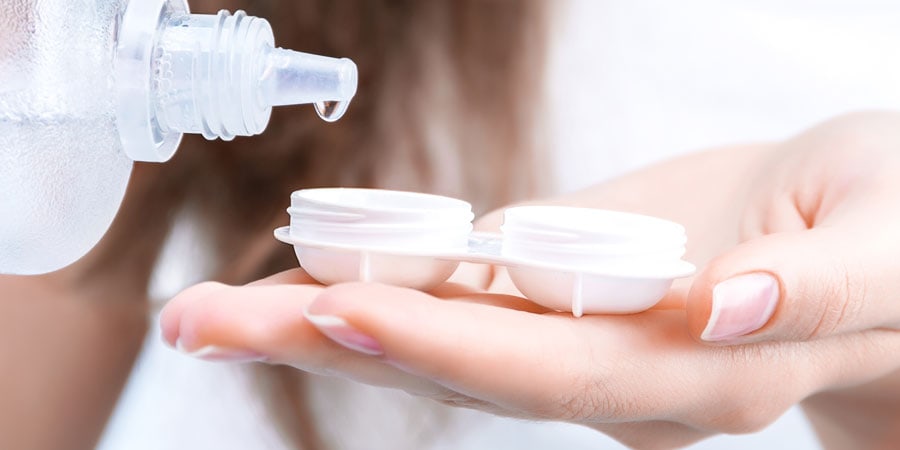What Is the Importance of Proper Contact Lens Care

This article examines the significance of proper contact lens care in relation to eye health.
It explores the crucial role of contact lens hygiene in preventing infections and emphasizes the importance of maintaining clear vision through proper care.
Additionally, it highlights the potential for extending the lifespan of contact lenses through careful maintenance.
The article also addresses common mistakes in contact lens care and provides guidance on how to avoid them.
Overall, it aims to emphasize the importance of adhering to proper contact lens care practices for optimal eye health.
Key Takeaways
- Proper contact lens care practices are crucial for maintaining optimal eye health.
- Failure to clean and disinfect lenses properly can lead to bacterial accumulation and eye infections.
- Adhering to proper contact lens care practices is important for preventing complications and promoting ocular health.
- Regular check-ups help monitor eye health and detect potential issues early on.
The Link Between Proper Contact Lens Care and Eye Health
The relationship between adhering to proper contact lens care practices and maintaining optimal eye health is a topic of significant importance. Improper contact lens care can have a detrimental impact on eye health. Failure to clean and disinfect contact lenses properly can lead to the accumulation of bacteria and deposits on the lenses, which can cause eye infections and other complications.
Regular check-ups for contact lens wearers are crucial for monitoring eye health and detecting any potential issues early on. These check-ups allow eye care professionals to assess the condition of the eyes, evaluate the fit of the contact lenses, and provide necessary adjustments or recommendations.
Avoiding Infections: Why Contact Lens Hygiene Is Crucial
Avoiding infections is crucial, as maintaining appropriate contact lens hygiene is vital for preventing potential health risks. Contact lens wearers are at a higher risk of developing infections compared to those who do not wear contact lenses. In order to prevent complications and promote ocular health, it is important to follow proper contact lens care practices. This includes washing hands before handling lenses, cleaning and disinfecting lenses regularly, replacing lenses as recommended, and avoiding contact with water while wearing lenses. These practices help to remove debris, bacteria, and other microorganisms that can accumulate on the lens surface and cause infections. By adhering to these hygiene practices, contact lens wearers can significantly reduce the risk of developing infections and maintain good eye health.
| Proper Contact Lens Care Practices | Benefits |
|---|---|
| Wash hands before handling lenses | Removes bacteria and prevents contamination |
| Clean and disinfect lenses regularly | Eliminates debris and microorganisms |
| Replace lenses as recommended | Prevents accumulation of bacteria and deposits |
| Avoid contact with water while wearing lenses | Reduces the risk of infection |
Maintaining Clear Vision: The Role of Proper Contact Lens Care
Maintaining clear vision relies on adhering to appropriate practices for hygiene and maintenance of contact lenses. Poor contact lens care can have a significant impact on eye health.
Failure to properly clean and disinfect contact lenses can lead to the accumulation of bacteria and other microorganisms on the lens surface, increasing the risk of eye infections such as keratitis. These infections can cause discomfort, redness, and even vision loss if left untreated.
However, by using contact lens solution properly, individuals can effectively remove debris, protein deposits, and microorganisms from their lenses, reducing the risk of infection and maintaining clear vision.
The benefits of using contact lens solution include improving lens comfort, preventing complications, and extending the lifespan of the lenses.
Proper care and maintenance of contact lenses are essential for ensuring optimal eye health and visual clarity.
Extending the Lifespan of Your Contact Lenses Through Careful Maintenance
By following recommended cleaning and disinfection practices, individuals can effectively prolong the lifespan of their contact lenses. Careful handling and proper cleaning techniques are crucial for maintaining the quality and durability of contact lenses.
When handling contact lenses, it is important to wash hands thoroughly with soap and water before touching them. This helps to prevent the transfer of bacteria and other contaminants onto the lenses.
Cleaning techniques involve using a recommended contact lens solution to rinse and rub the lenses, removing any debris or protein deposits that may have accumulated. It is essential to follow the manufacturer’s instructions for cleaning and disinfecting the lenses, as well as the recommended replacement schedule.
Regularly cleaning and disinfecting contact lenses not only helps to prevent eye infections but also ensures that the lenses remain comfortable and provide clear vision for an extended period.
Common Mistakes in Contact Lens Care and How to Avoid Them
One common mistake made in the care of contact lenses is not following the recommended replacement schedule, which can lead to a decrease in the quality and durability of the lenses over time. Other common mistakes include failing to clean and disinfect the lenses properly, wearing lenses while swimming or in hot tubs, and not replacing lens cases regularly. These mistakes can increase the risk of eye infections and other complications. To avoid these issues, it is important to adhere to the recommended replacement schedule, clean and disinfect lenses as instructed, avoid wearing lenses in water, and replace lens cases every three months. By following these guidelines, contact lens wearers can maintain good eye health and reduce the risk of infections.
| Common Mistakes | How to Avoid Infections |
|---|---|
| Not following replacement schedule | Adhere to recommended schedule |
| Improper cleaning and disinfection | Follow proper cleaning and disinfection procedures |
| Wearing lenses in water | Avoid wearing lenses while swimming or in hot tubs |
| Not replacing lens cases regularly | Replace lens cases every three months |
Frequently Asked Questions
How Often Should I Replace My Contact Lens Case?
The replacement frequency of contact lens cases is an important aspect of proper storage and hygiene practices. Regularly replacing contact lens cases helps to prevent the accumulation of bacteria and other microorganisms, reducing the risk of eye infections.
Can I Swim or Shower With My Contact Lenses?
Swimming with contact lenses is generally not recommended due to the risk of contamination and potential damage to the lenses. Showering with contact lenses can also increase the risk of infection and should be avoided if possible.
Is It Necessary to Remove Contact Lenses Before Going to Bed?
Removing contact lenses before going to bed is essential for proper contact lens care. Failing to do so can result in various risks, such as corneal infections or discomfort. Therefore, understanding the importance of this practice is crucial for maintaining healthy eyes.
Should I Use Tap Water to Rinse My Contact Lenses?
Using tap water to rinse contact lenses is not recommended due to the potential risks associated with waterborne microorganisms. There are alternative contact lens rinsing methods, such as using sterile saline solution, that are safer and maintain lens hygiene.
What Are the Consequences of Not Properly Cleaning and Disinfecting Contact Lenses?
Improper cleaning and disinfection of contact lenses can lead to serious consequences such as eye infections and corneal ulcers. Proper contact lens care is crucial to prevent these complications and maintain ocular health.








